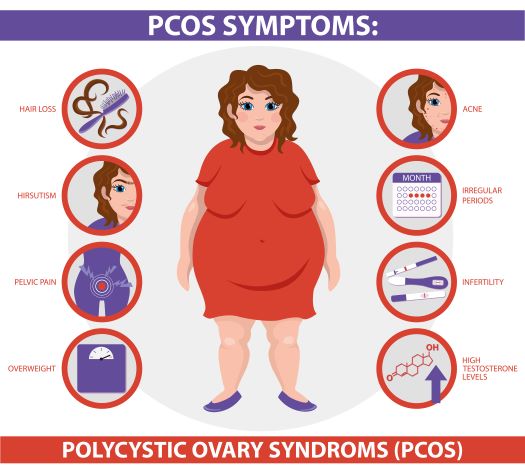One of the most prevalent reasons for infertility in women in the world today, is Polycystic Ovarian Syndrome or PCOS, as it is most commonly known. Worldwide, PCOS affects a staggering 44% – 20% of women of reproductive age.
WHAT IS PCOS?
PCOS is a condition where the ovaries, for reasons that are not yet clear to doctors and researchers, enlarge in size and form multiple cysts. These enlarged ovaries produce more than the usual amounts of the hormone androgen. Excess androgens are converted to estrogen in the body which further causes imbalance in the endocrine system. Androgen is considered a “male” hormone, as it is responsible for many of the secondary sexual characteristics in men. However, in women, increased production causes a hormonal imbalance, which gives rise to a host of unpleasant symptoms, of which decreased fertility is one.
PCOS can affect any woman from the time of puberty to menopause. In fact, it is sometimes the reason why some young girl’s develop primary amenorrhea (delay in the first period). Lifestyle habits, high levels of insulin in the blood, and genetic predisposition, are some of the contributory causes that doctors have identified thus far.
PCOS SYMPTOMS AND DIAGNOSIS
Symptoms
- Irregular periods –delayed and/or frequent cycles
- Infertility
- Weight gain / obesity
- Excessive or male pattern growth of hair on face and body
- Thinning or balding head hair
- Acne and hyperpigmentation patches on skin
- Insulin resistance
- Depression
Diagnosis
- Determining the irregularity of the menstrual cycle
- Testing for elevated levels of hormones
- Using ultrasound scanning to examine the ovaries for any enlargement, and the presence of at least twelve cysts
HOW DOES IT PREVENT PREGNANCY

The high levels of male hormones and estrogen prevent ovulation, thereby causing irregularities to the period cycle, while also making viable eggs unavailable for fertilization.
PCOS TREATMENT TO FACILITATE PREGNANY
Unfortunately, PCOS cannot be cured, however, it definitely can be managed.
Lifestyle Modification
For women with PCOS, the first and foremost step towards wellness is lifestyle change. This entails healthy diet, regular exercise and losing excess body fat to achieve optimal body weight.
Scientists have suggested that there exists a strong link between excess sugar levels in the blood, the resultant insulin resistance, and the development of PCOS. Thus, a balanced diet rich in whole grains, complex carbohydrates, legumes, lean proteins, healthy fats, green leafy vegetables, other high-fiber vegetables and fruits, and anti-inflammatory foods and spices (berries, turmeric, fennel, etc.), can do wonders in regulating blood sugar levels, reducing body weight and inflammation.
In fact, it has been established that even a 10% decrease in body weight in PCOS sufferers, most of whom are overweight or obese, could make period patterns more predictable.

Avoiding unhealthy and inflammatory foods and lifestyle habits such as excessive consumption of simple sugars, processed foods, trans fats, carbonated beverages, caffeine, smoking and alcohol, can be extremely beneficial to overall health, particularly in preparing the body for successful fertility treatments.
In addition to this, vitamin/mineral supplements may be taken to help with any nutritional deficiencies. There are quite a number of trusted herbal supplements too, that may be used to alleviate PCOS symptoms. However, it is important to follow the doctor’s advice before doing so.
Medical consultation may be helpful in the symptomatic treatment of other issues like acne, hyperpigmentation, hair loss, and excessive body hair.
Practicing guided mindfulness, and even professional counseling, may help in dealing with the chronic stress and depression that sometimes affect women with PCOS.
For more information on improving fertility, read 11 TIPS TO GET PREGNANT.
Regulating Periods
Before embarking on an infertility program, doctors may prescribe birth control pills for a couple of months in an attempt to regulate the menstrual cycle, and relieve other period-related problems such as excessive or scanty bleeding.

Inducing Ovulation
Needless to say, birth control pills prevent pregnancy. Thus, after the menstrual cycle is stabilized, the next step would be to induce ovulation through medications that usually bring down levels of estrogen in order to facilitate ovulation.
Additionally, it may also help to naturally track ovulation, and time sex within the fertile window to maximize chances of conception.
Diabetes drugs such as metformin are also commonly used to deal with the problem of insulin resistance, and high blood sugar levels in PCOS sufferers.
Fertility Treatments
When all else fails, the next course of action should be to seek the help of a fertility specialist – a doctor who specifically treats infertility.
First, a thorough clinical examination to investigate all relevant physical and biomedical parameters will be conducted. The fertility specialist would reiterate the importance of lifestyle modification (as explained above) in achieving optimal health and wellbeing goals, in order to prepare the mind and body for the rigorous procedures involved in fertility treatments. Treatment usually begins with prescribing medications such as Clomid, to trigger the ovaries to release more fertile eggs.

Next, Intra Uterine Insemination (IUI) procedures may be tried a few times. This involves injecting semen directly into the uterus to increase the chances of fertilization. IUI is less expensive than IVF, however, the latter has been found to be the most successful infertility procedure for PCOS.
In-Vitro Fertilization or IVF refers to the artificial insemination of harvested eggs under sterile conditions in a laboratory. Colloquially known as the “test-tube baby” procedure, it is a very expensive and long process that can take months to years to achieve success.
Some cases of PCOS call for ovarian surgery to remove some of the excess tissue to control hormone production.
TAKEAWAY
In summary, nearly 80% of infertility cases cite PCOS as the cause due to problems in ovulation. A woman is fifteen times more likely to not conceive with this condition than without. However, it is not an impossible scenario. With positive lifestyle changes, and the guidance of a fertility specialist, it is absolutely possible to have children even with PCOS. If PCOS is suspected, it is better to get a diagnosis right away, because the sooner treatment begins, the lesser the long-term effects on health, particularly reproductive health.


